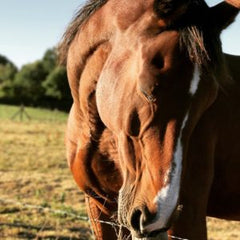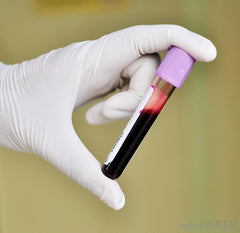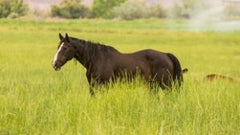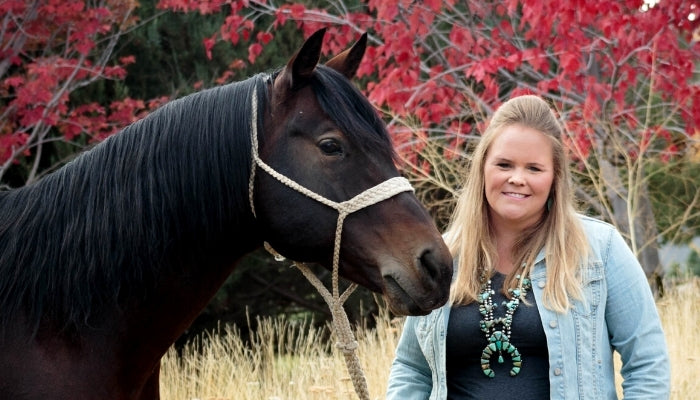Selenium Deficiency linked to the deaths of Horses in Central Oregon
I wanted to share a story to help educate horse owners on the importance of making sure your horses' vitamin and mineral needs are being met, especially selenium. When I talk to people in the Northwest, most know that we live in a selenium-deficient area. However, when I ask them what they supplement their horse with some people reply that their horse looks fine so they aren't deficient. But this actually very far from the truth, their horse is not actually "fine".Vitamin and mineral deficiencies affected many different functions that you can't see with your bare eyes. When the deficiencies are bad enough is the only time that symptoms will visually show, and when this point is reached your horse is in a ton of trouble. The supportive care to nurse them back to health, if even possible, will be a substantial cost.

I got a call recently from a local woman, who had had quite the ordeal in the last couple months with her Arabian horses, and was wondering if I might be able to shed some light on the situation. This woman breeds raises, and trains Arabian endurance horses, and also is very active in horse rescue with over 40 horses on her property. So her story goes as follows: On June 19th, she noticed one of her 4-year-old stallions, Memphis, behaving peculiar. He was standing over the water trough and didn't move between the time she first noticed him and after finishing her chores. When she went to examine him closer, she realized Memphis was foaming and drooling from the mouth and had a mouthful of wet hay. She took him to the veterinarian and ran a full blood panel. While at the veterinarian, Memphis had blood in his urine. Sadly, Memphis passed away within 36 hours. When the blood panel was returned his white blood cell count was low, but no glaring problems. Selenium status was not analyzed. One week after Memphis passed away, the woman had two more stallions become ill. Sawyer (15) and Petey (12) were both found drooling, with a mouthful of hay, over water troughs. Upon discovery, she took them to Bend Equine. When the horses arrived at the vet clinic their swallowing reflex was gone. Complete blood panels and selenium tests revealed that selenium levels were in 3 and 5 ng/mL of whole blood! *** Adequate selenium levels are 160-275 ng/mL of whole blood.*** The stallions were immediately started on IV fluids, received E-Se shots and were started on Horse Guard. Sawyer and Petey received IV fluids for several days to recover, and have both been on Horse Guard since the incident. Both of the stallions fully recovered. Upon re-sampling, Sawyer's selenium levels 228 ng/mL of whole blood after 3 months of supplementation. At the beginning of September, a neighbor a mile down the road from the woman, who fed different feed, had a 20-year-old mare become ill. The mare received an E-Se shot, however, she did not receive IV fluids. She passed away within 48 hours. Selenium analysis revealed whole blood selenium concentration of 4 ng/mL of whole blood.

One week later, the same neighbor had another mare become ill. She was an 8-year-old daughter of the mare that had passed. The owner suspected that she was extremely selenium-deficient like the others and decided to not run any bloodwork on her. She was immediately given a E-Se shot and started on IV fluids. The mare made a full recovery. After the entire ordeal, the owner of the original sick horses decided to test selenium levels on two random mares at her place which received salt blocks but no other form of supplementation.
Lilly, a pregnant mare on irrigated pasture and alfalfa hay, was found to be selenium deficient at 98 ng Se/mL whole blood. The deficiency could not only cause problems for the mare, such as a retained placenta, but it also put her foal in grave danger of disease because of a suppressed immune system. If the mare's selenium status was low enough, the foal could suffer from a white muscle disease and ultimately die because muscle damage to the diagram and large skeletal muscles which affect its ability to breathe, stand, and suckle.

The second mare tested was Porsche, an older open mare on dry lot being fed Timothy hay and Alfalfa, was found to be selenium deficient at 58 ng Se/mL whole blood. Both of these mares were substantially lower than the threshold of what is considered adequate (160 ng Se/mL whole blood), and although the owner had not seen any signs exhibited these mares had a greater risk of contracting any disease they encounter, and wouldn't be able to perform with optimal muscle function.
Without help, these mares selenium status would have most likely kept declining and eventually cause potentially fatal selenium deficiency. This story helps to drive home the point of how crucial it is to supplement with selenium in Northwest! I have heard people from the Willamette Valley say that they don't need to supplement their horses because they buy their hay from Central Oregon. I am here to tell you that they are dreadfully wrong. If you have a selenium-deficient horse you may or not be able to see subtle signs.
Ask yourself:
- Does your horse have tight muscles?
- Is he prone to tying up?
- Does he have a dull hair coat or act lethargic?
All are signs that your horse is selenium deficient. However, I use the analogy of an iceberg many times. Like an iceberg, in your horse's body there are many things that you can't see effected by selenium deficiency that negatively impacting your horse's health.
If you have want to assure yourself that your horse is selenium deficient without supplementation give your veterinarian to test your horse's whole blood selenium status. Supplementing with Horse Guard, at around $0.30 per day, is pretty cheap insurance for the optimal health of your horse. It could save you costly vet bills and possibly the death of a beloved companion.






Leave a comment (all fields required)